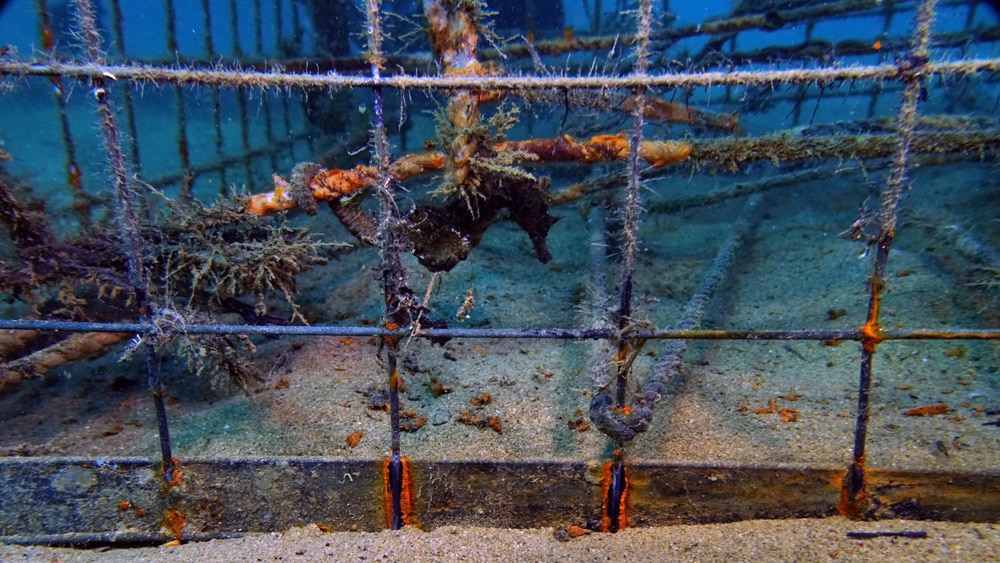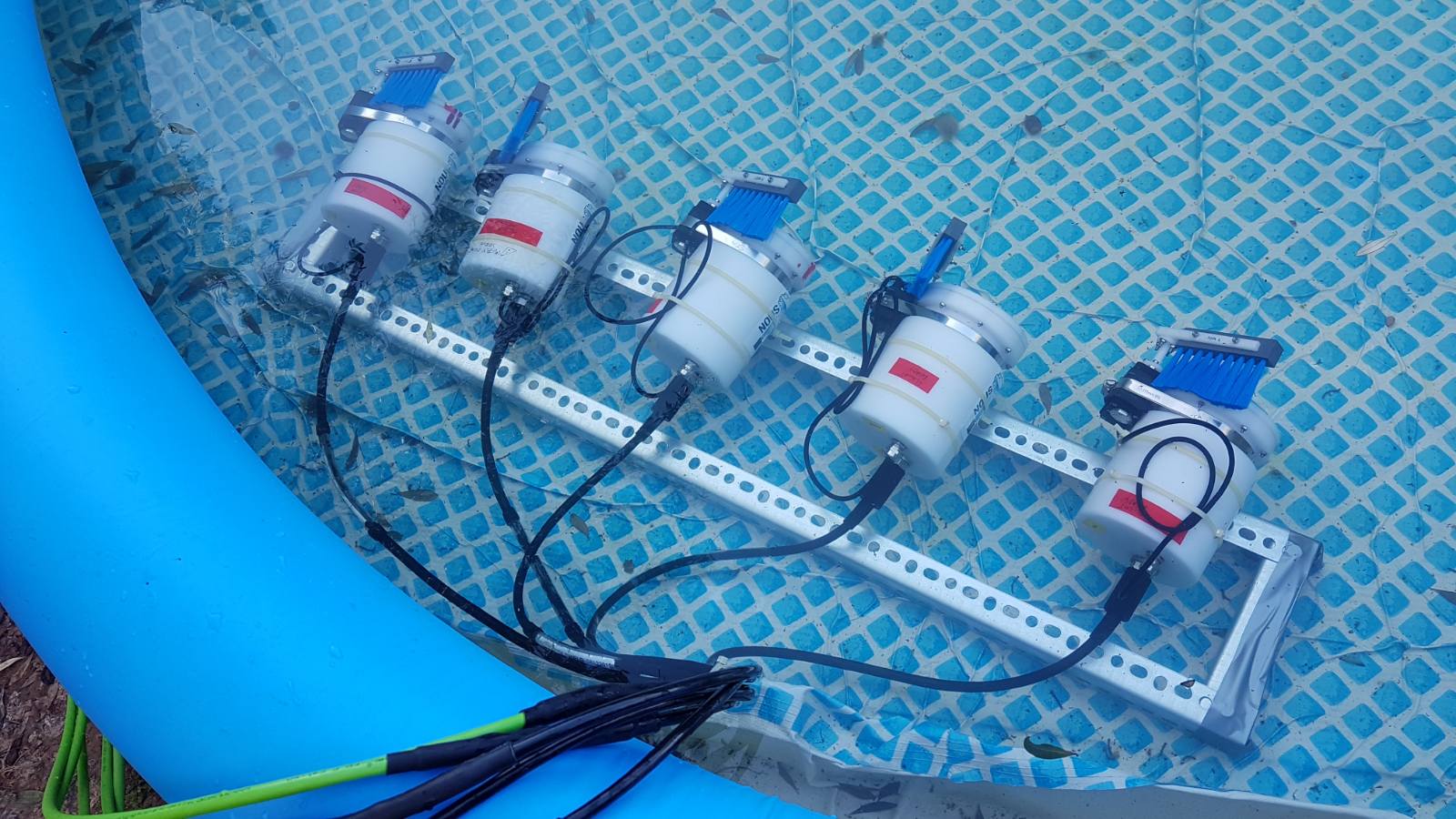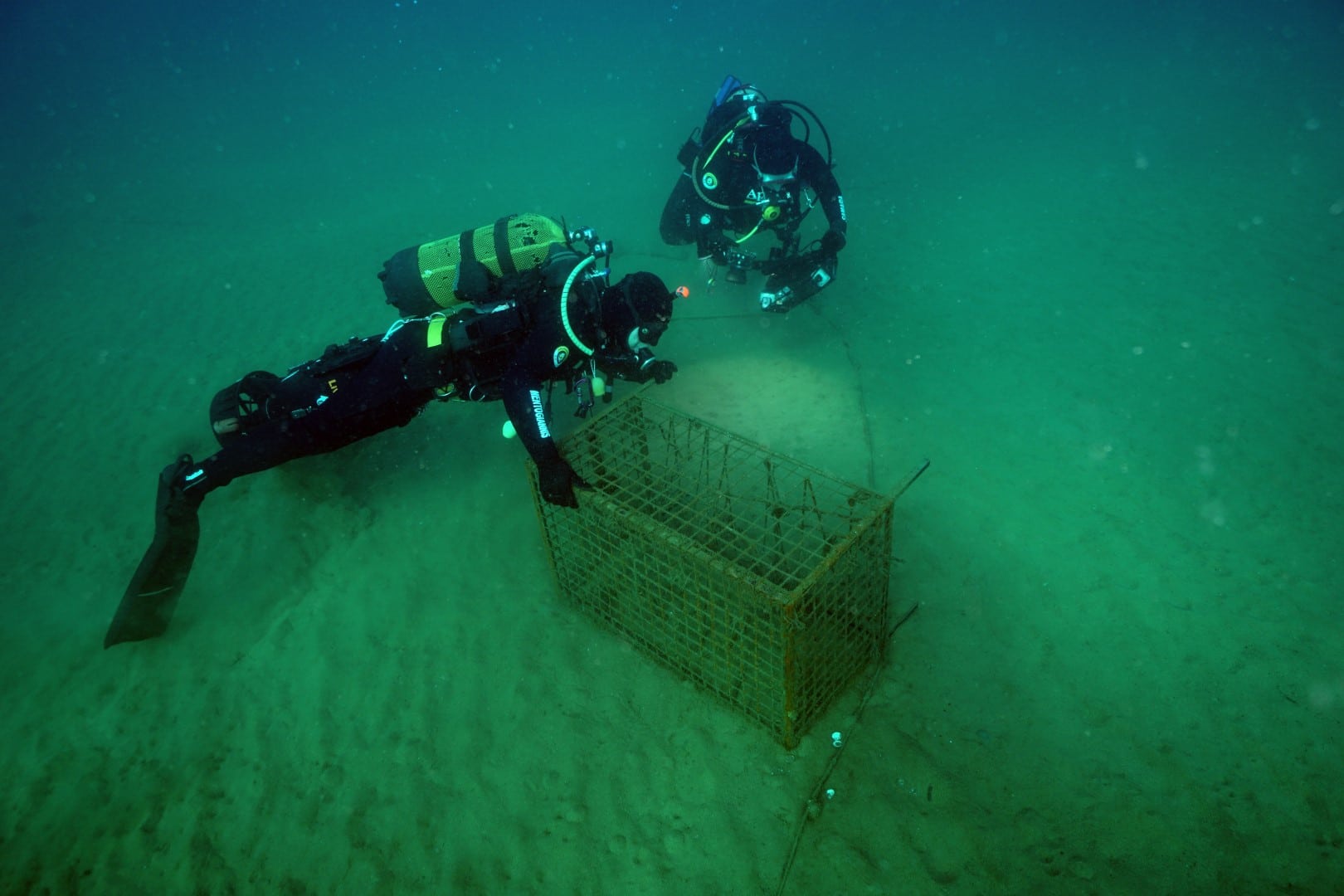Marine Life & Conservation
Saving Seahorses during a Pandemic

Around the world, it’s the same story: divers used to being in the water everyday are finding themselves stuck at home. Programs, training, dive expos, expeditions and underwater research have all been cancelled or postponed. But what about the divers who couldn’t just pack up their bags and wait until the pandemic blew over? We sat down with Vasilis Mentogiannis, founder of the Hippocampus Marine Institute, to hear about ‘prototype housing’, his underwater surveillance project nearly destroyed by the pandemic.
A Diver’s Greek Paradise
Since 2007, Vasilis Mentogiannis has dedicated his professional life to studying seahorses. Fast forward a decade and Vasilis founded the Hippocampus Marine Institute, a non-profit organization whose main focus is the study and protection of seahorses. His work didn’t stop there, however. Up until the days of the COVID-19 outbreak, he had spent his time doing research with a team at a wreck site just off the coast of Peristera Island in Greece. On this particular Greek island, divers are able to examine one of the most important wrecks of the classical era (sometime around 425 BC), as this sunken merchant barge carried more than 3,000 wine amphorae.
A Narrow Escape
It was at this very spot, as Vasilis and his research team were installing their prototype housing system around the amphorae that they received the order to evacuate. When asked further about the project, Vasilis responded that prototype housing is “the installation of an underwater, self-powered system (equipped with solar panels) providing real-time video streaming from five cameras. The housing system is connected to a land station which collects data and statistics regarding the weather, wind speed and direction, rainfall, and UV rays at the wreck site. The ultimate goal is to collect all data necessary to create the technical conditions for breeding seahorses in order to implement their population.”
Today, this area is closed off to divers, and the camera system is able to both live-stream the wreck site from underwater for anyone to see online as well as provide surveillance, keeping the location safe from any such divers thinking they might like to make off with an amphora or two. Unfortunately, the global pandemic brought Vasilis’ work to a screeching halt. “When the virus made its way to Greece, we were still performing the system installation. It was really difficult because we had to stop all our activities and return to Athens.” Vasilis goes on to explain the potential danger of leaving a project like this so abruptly and unfinished, “If we had left the system as it was, it would have been destroyed as soon as the next bout of bad weather hit.”
Luckily, Vasilis and his team were able to finish the installation in time as well as apply a few key protective measures. “It was a really stressful situation. The day after we left the site, the weather got bad. I imagine if we hadn’t stayed to secure it, it would have been destroyed by now.” The potential losses were enormous, Mentogiannis continues, including a 200-meter power cable and fiber optic cable, an underwater hub, solar panels, batteries, etc.
Vasilis credits the company Divesoft for the role it played in providing the much-needed equipment that made such a time-critical project possible. The reliable Freedom computers came in when Vasilis was feeling the pressure to complete the installation. With the help of a good team and the right dive gear, Vasilis was able to complete the project in time, making his prototype housing system a success.
Prototype Housing’s Next Application
Now, Vasilis is waiting at home, hoping the outbreak will come to an end as soon as possible. His intentions are to prepare his prototype housing “seahorse cage-hotels” for surveying and protecting the Stratoni seahorse colony (also located in Greece, just north of the Peristera Island wreck). “The same system will be tested in Stratoni, but with a different task. The main goal will be to recognize the seahorses and provide as much feedback and information as possible,” explains Vasilis. “One of our first systems is about 90% ready, but we haven’t been able to test it as the virus closed all of us off at home.”
Hope for the Future
We’re looking forward to the day to come in which Vasilis, his team, as well as the rest of us, can return to the water. At times like these, we have to keep positive and try to focus on the good. Vasilis is more than satisfied that they were able to finish their installation work and save their project in Greece. Now he, like so many of us, is just itching to get back to his prototype housing projects, and is especially looking forward to seeing the seahorses again. Coronavirus may have succeeded at slowing Vasilis and his team down, but the fight’s not over yet. A priority to preserve and safeguard the remaining seahorse population in the area remains.
For more information about the Hippocampus Marine Institute visit their website by clicking here.
Marine Life & Conservation
Paul Watson Released as Denmark Blocks Japan’s Extradition Bid

Renowned anti-whaling activist Paul Watson has been released from custody in Greenland after spending five months in detention. Denmark’s Justice Ministry rejected Japan’s request for his extradition, citing insufficient guarantees that his time already served in custody would be credited against any potential sentence.
The 74-year-old Canadian-American was arrested on July 21 in Nuuk, Greenland’s capital, when his ship docked to refuel. His arrest was based on a 2012 Japanese warrant related to a 2010 encounter in Antarctic waters. Japan alleged Watson obstructed operations and caused damage to a whaling research ship during efforts to disrupt illegal whaling. Watson has consistently denied these claims, maintaining his commitment to marine conservation.
Denmark, which oversees extradition matters for Greenland, concluded that while the legal conditions for extradition were met, the lack of assurances from Japan regarding time-served credit made extradition untenable.
In a video shared by his foundation, Watson expressed gratitude and relief, saying, “After five months, it’s good to be out… and good to know they’re not sending me to Japan.” He added that the most difficult part of his time in custody was being separated from his two young sons.
Watson is a pioneering figure in marine conservation, known for founding the Captain Paul Watson Foundation in 2022 after decades of activism with the Sea Shepherd Conservation Society. His bold efforts to defend marine life have earned him widespread support, including from celebrities and conservationists. His work has also been featured in the acclaimed reality TV series Whale Wars.
Watson’s lawyer, Jonas Christoffersen, praised the decision, stating, “We are happy and relieved that Paul Watson is now free.” He added that Watson is eager to reunite with his family and continue his vital work.
The arrest occurred while Watson’s vessel, the M/Y John Paul DeJoria, was en route to the North Pacific with a team of 26 volunteers to intercept a Japanese whaling ship. His foundation described the arrest as politically motivated and emphasized that Watson’s actions were focused on ending illegal whaling practices.
Japan resumed commercial whaling in 2019 after leaving the International Whaling Commission, asserting that whale meat is a cultural tradition. Conservationists, however, continue to challenge these practices, highlighting their impact on marine ecosystems.
Despite the challenges, Watson remains steadfast in his mission to protect marine life and bring attention to whaling practices. His dedication to ocean conservation has made him a globally respected advocate for the environment.
Marine Life & Conservation
12 Days of Zero-Waste Fish-mas

This holiday period, the Marine Conservation Society, the UK’s leading ocean membership charity, invites you to make some simple changes to eating fish this Christmas to help our seas.
Dr Kenneth Bodles, Head of Fisheries and Aquaculture at the Marine Conservation Society, said, “During the festive season, our consumption increases, but so does waste. Sustainability isn’t just about where food comes from – it’s also about how you use it. By reducing waste and making the most out of your seafood, you’re not only taking steps to be more ocean-friendly, but can also help to cut costs during what is often one of the most expensive times of the year”.
The Marine Conservation Society has compiled twelve tips on how to consume seafood sustainably with zero-waste this Christmas:
Buy whole fish instead of fillets
Instead of fillets, consider buying whole fish such as salmon, hake, or lemon sole. By adopting a “nose to tail” approach with cooking, whole-baked fish not only feeds a crowd, but also helps to minimise waste and maximise sustainability by using up every part of the animal, including bones, skin, and fat.
Make fish stock
Leftover fish bones or shells can be put to good use by boiling them to make a nourishing fish stock or bisque. This can be frozen and preserved for later use and makes for a flavourful base in a soup.
Make your own fish pâté
Avoid waste by turning leftover fish, such as smoked mackerel or salmon, into a delicious pâté by blending with cream cheese and lemon. Perfect when paired with crackers.
The sustainability of salmon and mackerel varies depending on where and how it is caught or farmed. For more information on green-rated options, check the charity’s Good Fish Guide.
Buy frozen
By purchasing seafood that is frozen or vacuum-packed, this helps to reduce waste by extending the shelf life of your food.
Fish pie
If you’re wondering what to do with leftover cooked fish, why not opt for a classic fish pie with mashed potatoes, leeks, and a cheesy sauce? A sure crowd pleaser on Boxing Day.
Use the head
Don’t forget the fish head! The meat is incredibly tender and flavourful. The charity recommends a cod’s head curry or recreating Fallow’s renowned cod’s head in siracha butter.
By stretching your ingredients further, not only is this a more sustainable way to enjoy seafood, but also cost-effective by repurposing leftovers and cooking creatively.
Boxing Day brunch
Mix leftover kippers or smoked salmon with scrambled eggs for a tasty, zero-waste, Boxing Day brunch.
For best choice, make sure you buy kippers, or herring, from the North Sea and the North Irish Sea.
Zero-waste storage
A top tip from the Marine Conservation Society to avoid waste is freezing fish offcuts to save for future use.
Crisp up the skin
Even leftover fish skin can be turned into a quick savoury snack by crisping it up in an air fryer with a little olive oil and salt.
Anchovies two ways
Leftover anchovies can either be blended with butter to make a delicious anchovy butter or tossed into pasta for a hit of umami flavour.
The charity recommends opting for anchovies caught in the Bay of Biscay for best choice.
Fishcakes
For an easy, zero-waste meal, leftover seafood trimmings can be mixed with mash and fried in breadcrumbs to make fishcakes.
Pickled mussels
Try pickling mussels in 1:1 vinegar and water, with a dash of sugar for a sustainable, zero-waste snack that can be enjoyed well beyond the festive season.
Mussels farmed in the UK are a seafood superhero. Grown using low-impact methods and harvested by hand, they get all the food they need from the sea around them. This makes them one of the most sustainable, ocean-friendly, and cost-effective seafood options.
Players of People’s Postcode Lottery have raised £6.6M towards the Marine Conservation Society’s vital work in making seafood more sustainable.
Laura Chow, Head of Charities at People’s Postcode Lottery, said: “Fish is a festive favourite for many, but making sustainable choices when it comes to how we buy and eat seafood makes all the difference for our ocean. Support from players of People’s Postcode Lottery has helped the Marine Conservation Society further its sustainable seafood work, so that we can all enjoy healthier, better protected seas.”
The Marine Conservation Society encourages you to make sustainable seafood choices a year-round habit, not just for Christmas. To check how sustainable the seafood on your plate is, you can visit the charity’s Good Fish Guide. The Guide helps consumers and businesses identify the most sustainable seafood using a simple traffic light system, based on where and how species are caught or farmed. Green is the best choice, amber means improvements are needed, and red indicates fish to avoid buying.
Zero-waste gift idea
Why not embrace a zero-waste Christmas by gifting a membership to support marine conservation? It’s a meaningful, low-waste gift that helps protect our ocean for generations to come. Memberships start from as little as £5 a month – the price of a sandwich and drink from your local coffee shop.
Find the latest sustainable seafood advice for wild-caught and farmed seafood on the Good Fish Guide, downloadable to your phone from www.mcsuk.org/goodfishguide.
-

 News2 months ago
News2 months agoIconic SS United States to become the World’s Largest Artificial Reef
-

 News3 months ago
News3 months agoBook Review – 52 Assignments: Underwater Photography
-

 Gear News3 months ago
Gear News3 months agoDYNAMICNORD – New German diving brand enters the British market
-

 News3 months ago
News3 months agoExploring Cenote El Pit: A Diver’s Dream
-

 Gear News3 months ago
Gear News3 months agoTry BARE drysuits (and maybe even win one!) this Friday with Sea & Sea at North West Dive Fest
-

 Marine Life & Conservation3 months ago
Marine Life & Conservation3 months agoBook Review: Coral Triangle Cameos
-

 Blogs2 months ago
Blogs2 months agoDive the Egyptian Red Sea this Autumn with Regaldive
-

 News3 months ago
News3 months ago2024 Ocean Art Underwater Photo Competition Announced

















